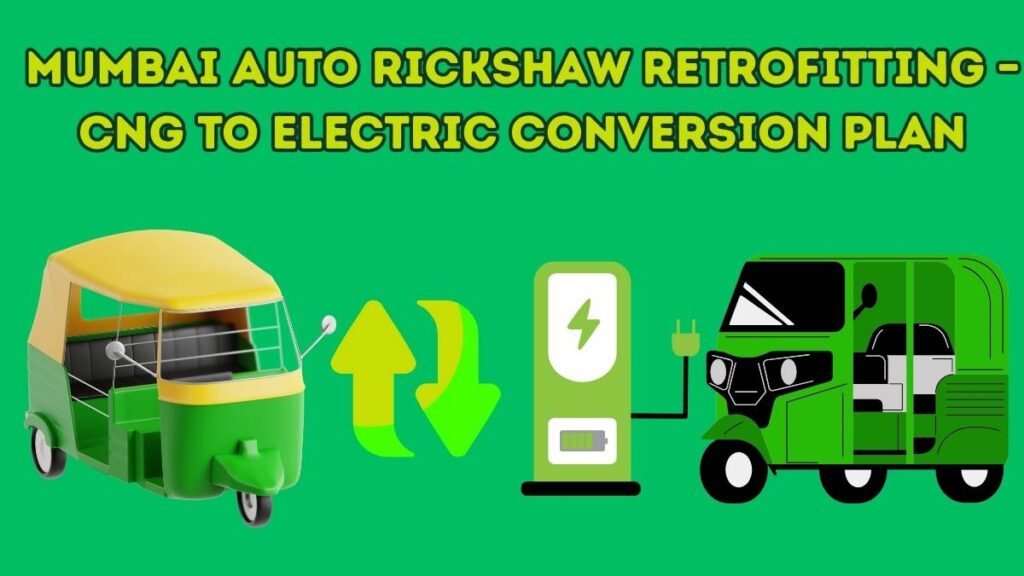
Key Highlights:
- Mumbai Rickshawmen’s Union proposes converting old CNG auto-rickshaws into electric vehicles through retrofitting.
- Retrofitting cost is about ₹1.6 lakh per vehicle — nearly half the price of a new electric auto.
- A working prototype has been approved in Pune and will soon be tested in Mumbai.
- Plan aims to cut pollution, reduce driver expenses, and speed up the city’s shift to clean transport.
The Big Shift Towards Electric Auto-Rickshaws
Mumbai, known for its bustling traffic and thousands of auto-rickshaws, could soon witness a major transformation in its public transport system. Instead of replacing old CNG-powered autos with brand-new electric vehicles, the Mumbai Rickshawmen’s Union has put forward a smarter, more affordable idea — retrofitting.
Retrofitting means removing the old CNG engine and replacing it with an electric motor and battery system. The body of the rickshaw stays the same, but the heart of the vehicle becomes electric. This makes it cheaper and faster for drivers to switch to cleaner energy.
Why Retrofitting Makes Sense for Mumbai
A brand-new electric rickshaw can cost ₹3 lakh or more, which is a huge amount for most drivers. Retrofitting brings down the cost to just ₹1.6 lakh, making it a much more affordable option.
Major benefits of retrofitting:
- Lower Fuel Costs: Electricity costs far less than CNG or petrol.
- Less Maintenance: Electric motors have fewer moving parts, meaning fewer breakdowns and lower repair bills.
- Eco-Friendly: No tailpipe emissions means cleaner air for Mumbai’s crowded streets.
- Faster Adoption: Retrofitting existing autos is quicker than waiting for new vehicles to arrive.
This initiative also supports India’s push towards sustainable mobility while helping rickshaw drivers save money.
Prototype Success in Pune – Mumbai Trials Next
The plan isn’t just on paper — it’s already been tested. A prototype retrofitted auto has been approved in Pune, meeting the required safety and performance standards. The next step is a trial run in Mumbai, where these electric conversions will be tested in real-life conditions, including heavy traffic, steep flyovers, and even during the monsoon season.
If the trials are successful, the Union plans to roll out the retrofitting program for thousands of rickshaws across the city.
Specifications – Retrofitted Electric Auto Prototype
| Feature | Details |
|---|---|
| Conversion Cost | ₹1.6 lakh |
| Range per Charge | 100–120 km |
| Charging Time | 3–4 hours (normal) |
| Top Speed | ~50 km/h |
| Battery Type | Lithium-ion |
| Maintenance Need | Low |
| Emission Level | Zero tailpipe emission |
Challenges That Need Solutions
While retrofitting is a promising step forward, there are challenges to consider:
- Initial Cost: Even at ₹1.6 lakh, many drivers may struggle without loans or subsidies.
- Charging Infrastructure: Mumbai will need more charging stations to support electric autos.
- Battery Life: Over time, replacing the battery can be expensive.
- Approval Process: Large-scale retrofitting needs smooth government approvals and safety checks.
The Union is likely to push for subsidies and bank financing to make this shift easier for drivers.
How This Could Change Mumbai’s Transport Future
If the retrofitting project is successful, Mumbai could see a faster transition to electric mobility compared to relying solely on new vehicle purchases. Thousands of existing CNG rickshaws could be converted in just a few years, reducing the city’s pollution levels and cutting fuel imports.
For drivers, this means lower running costs and better profit margins. For passengers, it means quieter, smoother rides. For the city, it’s a cleaner, healthier environment.
Q&A – Everything You Need to Know
Q1: What is retrofitting in vehicles?
Retrofitting is upgrading an existing vehicle by replacing its old engine with an electric motor and battery, without changing the vehicle’s main structure.
Q2: How much does it cost to retrofit a CNG auto to electric?
Around ₹1.6 lakh per vehicle, which is about half the cost of a new electric auto.
Q3: How far can a retrofitted electric auto go on a single charge?
The prototype offers a range of about 100–120 km per full charge.
Q4: When will Mumbai see these autos on the road?
Once trials in Mumbai are successful, retrofitted autos could be on the road within the next few months.
Q5: Will drivers get government subsidies for retrofitting?
Discussions are ongoing. If subsidies are approved, it will make the shift to electric much more affordable.
Final Thoughts
Mumbai’s auto-rickshaw electrification push through retrofitting could become a landmark project for India’s urban transport. By converting old CNG autos instead of scrapping them, the city can cut costs, speed up the shift to green mobility, and give drivers a real chance to save money while helping the environment.
If all goes well, this could inspire other cities to follow the same path — making retrofitting a key part of India’s electric vehicle revolution.